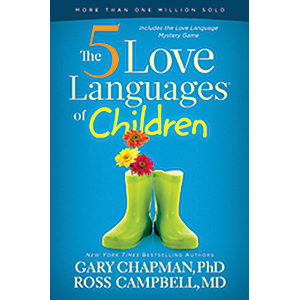
How to Discover Your Child’s Primary Love Language
 Want to show your children how much you love them? According to Gary Chapman and Ross Campbell, you can employ the following methods to discover your child’s primary love language:
Want to show your children how much you love them? According to Gary Chapman and Ross Campbell, you can employ the following methods to discover your child’s primary love language:
1. Observe How Your Child Expresses Love to You
While the authors understand this method isn’t effective with teenagers skilled at manipulation, it is appropriate for children ages five to ten. Apparently, if you’re hearing comments like “Mommy, I loved your dinner,” or “Daddy, thanks for helping me with my homework,” then Chapman and Campbell believe your child’s primary language is words of affirmation.
2. Observe How Your Child Expresses Love to Others
“If your first-grader always wants to take a present to his teacher, this may indicate that his primary love language is receiving gifts,” argue Chapman and Campbell.
3. Listen to What Your Child Requests Most Often
“If your child often asks you to play games with her, take a walk together, or sit and read a story to her, she is requesting quality time,” explain Chapman and Campbell. Another possibility, like frequent solicitations for positive feedback, such as “Did you like my song on the piano?” might indicate the love language words of affirmation.
4. Notice What Your Child Most Frequently Complains About
“Every child complains now and then, and many of these complaints are related to immediate desires and are not necessarily an indication of a love language. But, if the complaints fall into a pattern so that more than half the complaints focus on one love language, then they are highly indicative.”
Give Your Child a Choice Between Two Options
For several weeks, let your child choose between quality time and an act of service. Chapman and Campbell suggest you say, “We could take a walk together or I could hem your new skirt. Which would you prefer?” The answer speaks volumes.
Then, consider the following.
When your child’s primary love language is physical touch…
“Running your hand through your child’s hair, touching him on the shoulder or arm, patting him on the back or leg, along with some encouraging words, are all meaningful expressions of love to a growing child,” explain Chapman and Campbell. “Conversely, if you use physical touch as an expression of anger or hostility, you will hurt these children very deeply.”
When your child’s primary love language is words of affirmation…
“The words ‘I love you’ should always stand alone in reality or by implication. To say, ‘I love you…will you please do this for me?’ dilutes the theme of love. To say, ‘I love you but I’ll tell you right now…’ cancels itself out,” maintain Chapman and Campbell.” The words ‘I love you’ should never be diluted with conditional statements. This is true for all children, but especially for those whose primary love language is words.”
When your child’s primary love language is quality time…
“If quality time is your child’s primary love language, you can be sure of this: Without a sufficient supply of quality time and focused attention, your child will experience a gnawing uneasiness that his parents do not really love him,” believe Chapman and Campbell.
When your child’s primary love language is gifts…
“They see the gift as an extension of you and your love, and they want to share this moment with you. Once they have opened the gift, they will hug you or thank you profusely,” argue Chapman and Campbell.
When your child’s primary love language is acts of service…
“He or she does not merely want to get a task done; your child is crying for emotional love…This does not mean that you must jump at every request.” But Chapman and Campbell believe it does mean “that you should be extremely sensitive to those requests and recognize that your response will either help fill the child’s love tank or else puncture the tank.”
When I returned to work this fall, I felt like every free moment was spent meeting someone else’s needs. Exhausted from shuttling them around, I realized no one cared about my acts of service, such as whether the most recent Girl Scout badge was sewn on her vest, but judging from the complaints about never getting to “play” together anymore, they still weren’t feeling my love. While my older daughter favors gifts and my younger daughter physical touch, what they both needed was more quality time.
That’s why Chapman and Campbell argue, “Whatever your child’s love language may be, remember that it’s important to speak all five languages.” For love might conquer all but no one ever said it was easy.






